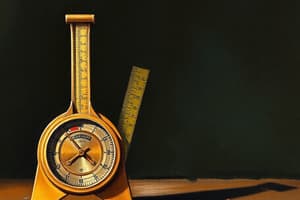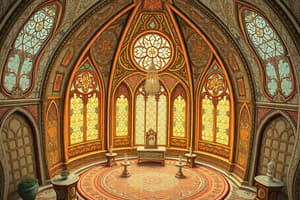Podcast
Questions and Answers
What is the formula to calculate the area of a triangle?
What is the formula to calculate the area of a triangle?
- Area = Length × Width
- Area = Side²
- Area = (Sum of base lengths ÷ 2) × Height
- Area = (Base × Height) ÷ 2 (correct)
Which shape is commonly used to express area in square units?
Which shape is commonly used to express area in square units?
- Rectangle (correct)
- Cone
- Sphere
- Cylinder
For which shape would you use the formula Volume = Length × Width × Height?
For which shape would you use the formula Volume = Length × Width × Height?
- Cube (correct)
- Pyramid
- Sphere
- Cylinder
What is the formula for calculating the volume of a sphere?
What is the formula for calculating the volume of a sphere?
Which of the following shapes has its volume calculated differently from a cuboid?
Which of the following shapes has its volume calculated differently from a cuboid?
What is the formula to calculate the volume of a cone?
What is the formula to calculate the volume of a cone?
Which real-world application can benefit from understanding how to calculate volume?
Which real-world application can benefit from understanding how to calculate volume?
What is the formula to calculate the volume of a pyramid?
What is the formula to calculate the volume of a pyramid?
Which shape has a volume formula that does not include height in the calculation?
Which shape has a volume formula that does not include height in the calculation?
Why is understanding area and volume important in real-world situations?
Why is understanding area and volume important in real-world situations?
Flashcards are hidden until you start studying
Study Notes
Measuring Space: Understanding Area and Volume
Measuring space is a crucial part of our everyday lives, from designing buildings to cooking a perfect cake. In this guide, we'll explore two fundamental aspects of measuring space: area and volume.
Area
Area is the amount of surface covered by a two-dimensional shape. It's commonly expressed in square units, such as square centimeters (cm²) or square meters (m²).
Square units: A square unit is a shape with equal sides and a right angle at each corner. Examples include squares, rectangles, and parallelograms.
Calculating area: There are several formulas for calculating area depending on the shape.
-
Rectangle: Area = Length × Width
-
Square: Area = Side²
-
Triangle: Area = (Base × Height) ÷ 2
-
Trapezium: Area = (Sum of base lengths ÷ 2) × Height
Volume
Volume is the amount of space occupied by a three-dimensional shape. It's usually expressed in cubic units, such as cubic centimeters (cm³) or cubic meters (m³).
Cuboid-shaped objects: A cuboid is a three-dimensional shape where all faces are parallelograms. Common cuboid-shaped objects include boxes, cupboards, and refrigerators.
Calculating volume: To calculate volume, multiply the length, width, and height of a cuboid:
Volume = Length × Width × Height
Other shapes: While cuboids are the most common shapes used to calculate volume, other shapes such as cones, spheres, cylinders, and pyramids have their specific volume formulas.
-
Cone: Volume = (1/3) × Pi × radius² × height
-
Sphere: Volume = (4/3) × Pi × radius³
-
Cylinder: Volume = Pi × radius² × height
-
Pyramid: Volume = (1/3) × base area × height
Real-world applications
Measuring area and volume is essential in various real-world situations, such as:
- Building construction
- Painting and decorating
- Land surveying
- Manufacturing
- Agriculture
- Sports and recreation
Knowing how to calculate area and volume can save you time and money when buying materials, estimating costs, or designing structures.
In conclusion, understanding area and volume is an essential part of measuring space. By learning these fundamental concepts, you'll be well-equipped to tackle a variety of real-world challenges. Whether you're decorating a room or designing a building, these skills will come in handy.
Studying That Suits You
Use AI to generate personalized quizzes and flashcards to suit your learning preferences.




